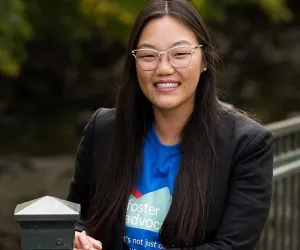We were so pleased to see EDTalks presenter Hannah Planalp from Foster Advocates featured in this Star Tribune column by Gail Rosenblum. Congrats, Hannah!
Fostering college dreams through Minnesota nonprofit
by Gail Rosenblum, Star Tribune
For many, the word "foster" immediately leads to "child." Hannah Planalp would like us to expand that thinking. After all, who among us with children in their 20s — or even 30s — feels like we're done parenting them? Planalp, 31, leads the Fostering Education Initiative at Twin Cities-based Foster Advocates, which supports fosters in reaching their dream of college or other post-secondary goals. A Korean adoptee and foster herself from Colorado, Planalp knows first-hand how one mentor can change the trajectory of a young foster's life. A graduate of the University of California, Berkeley, Planalp was a featured speaker last month at an EDTalks presentation sponsored by AchieveMpls in partnership with the Citizens League. She tells us more about her effort below.
Q: How did you find your way from Colorado to California to Minnesota?
A: I was eager to go somewhere new for college, and California seemed far away and exotic. After college, I was drifting a little and my brother was moving to Minnesota and offered to let me crash on his couch for a while. That was seven years ago. I stayed. I love it here.
Q: Did you know about Foster Advocates (fosteradvocates.org) when you came here?
A: It's a young organization, only four years old. I heard executive director Hoang Murphy talking about foster care at a party and I had questions about his work. He invited me to serve on the board. About a year later, they convinced me to come work for them.
Q: Most people think about fosters as being the youngest children and are likely surprised to hear you putting foster and college in the same sentence. How do you help us expand our thinking?
A: We see a lot of people moving homes while in foster care, exiting and re-entering care, or becoming homeless. Even before you turn 18, there can be a lot of instability. After 18, many of us aren't immediately independent and living on our own. Their social worker support might go away, along with other networks. Even foster parents sometimes go away. For others, parenting doesn't end at 18. Think about your own kids' college experience: Where did they go for school breaks or holidays? Who did they call when they had a problem they didn't know how to solve?
Read the full story on the Star Tribune website.
Watch Hannah's EDTalks on "Zero Debt College: A New Reality for Fosters."
